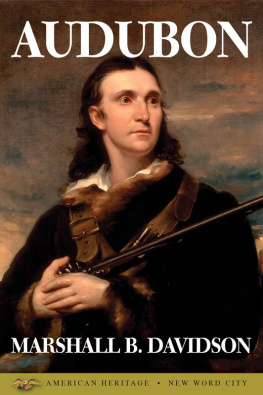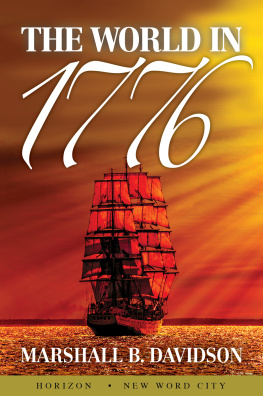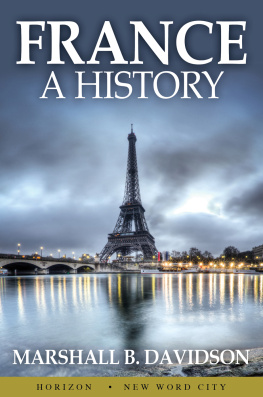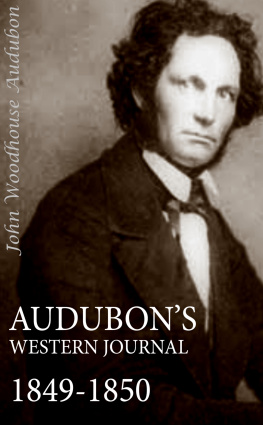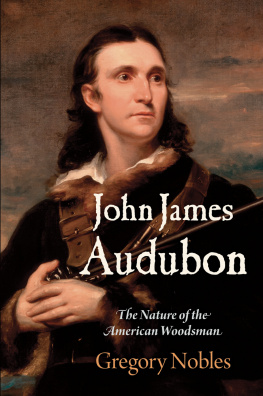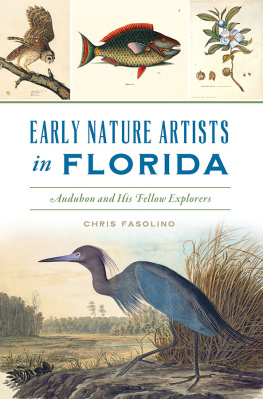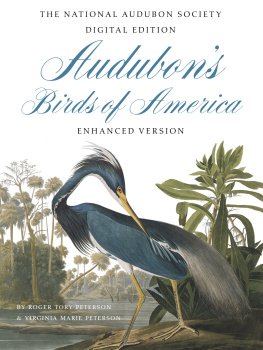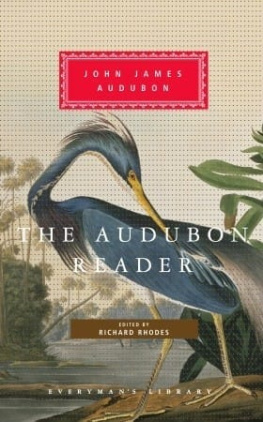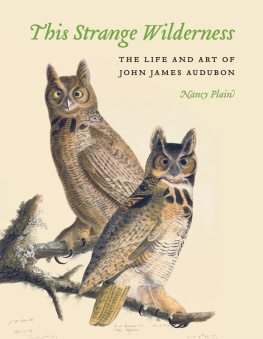Marshall B. Davidson - Audubon
Here you can read online Marshall B. Davidson - Audubon full text of the book (entire story) in english for free. Download pdf and epub, get meaning, cover and reviews about this ebook. year: 2014, publisher: New Word City, genre: Detective and thriller. Description of the work, (preface) as well as reviews are available. Best literature library LitArk.com created for fans of good reading and offers a wide selection of genres:
Romance novel
Science fiction
Adventure
Detective
Science
History
Home and family
Prose
Art
Politics
Computer
Non-fiction
Religion
Business
Children
Humor
Choose a favorite category and find really read worthwhile books. Enjoy immersion in the world of imagination, feel the emotions of the characters or learn something new for yourself, make an fascinating discovery.
- Book:Audubon
- Author:
- Publisher:New Word City
- Genre:
- Year:2014
- Rating:4 / 5
- Favourites:Add to favourites
- Your mark:
- 80
- 1
- 2
- 3
- 4
- 5
Audubon: summary, description and annotation
We offer to read an annotation, description, summary or preface (depends on what the author of the book "Audubon" wrote himself). If you haven't found the necessary information about the book — write in the comments, we will try to find it.
As the American frontier moved westward and wildlife declined, John James Audubon drove himself to record his wonders. Here, in this short-form book, is his story.
Audubon — read online for free the complete book (whole text) full work
Below is the text of the book, divided by pages. System saving the place of the last page read, allows you to conveniently read the book "Audubon" online for free, without having to search again every time where you left off. Put a bookmark, and you can go to the page where you finished reading at any time.
Font size:
Interval:
Bookmark:
In the course of compiling his mammoth inventory of the birds of America, John James Audubon killed a formidable number of them. He once boasted it was a poor days hunting when he shot fewer than 100. Like a number of his tales, this one may be taller than the truth. On the other hand, he reports in his diary the amusement he took in firing into a flock of birds to test his marksmanship. Once, on December 25, 1810, with a party of Shawnees , he caught a lake full of swans in a pitiless crossfire, until the water was covered with birds floating with their backs downwards, and their heads sunk in the water, and their legs kicking in the air. After eating a meal of pecan nuts and bear-fat soup, while the squaws worked into the night, Audubon went to sleep before the campfire very well satisfied with [his] Christinas sport.
In Audubons heyday, the American wilderness was just about the last place in the world to expect the prevention of cruelty to wild creatures or preservation of any living thing, save the human interloper, perhaps. The forests of the New World and all the game that sought their cover were thought inexhaustible; they would have to give way to people and their plans. There would be time later to regret the plundering that went with pioneering when the nation finally spread out and settled on its 3 billion acres of virgin land.
Audubon never did become a conservationist as his name is synonymous with today. Even as he picked off feathered specimens, he was aware his beloved frontier was vanishing rapidly. He did not pretend to say whether the changes were for the better or for the worse. He only knew with conviction that no one ever would have the same opportunity to record the birds of North America in their primeval haunts, and that realization drove him mercilessly to finish his inventory before it was too late.
He needed all variants to complete his studies, and from the beginning, he hired hunters when his gun was idle. In later years, when he was obliged to remain in England to attend to publication matters, he wrote his naturalist friend, the Reverend John Bachman of Charleston, pleading for more specimens: Take to your gun... go to the Woods, and go to the shores, or if you cannot at all send some worthy one on whom you can and I also depend... It will save me one year of Shooting and of ransacking the Woods singly....
Time was of the essence. From the moment he started to pursue what he called his great idea until the waning years of his life, he felt he never had a moment to lose. I am growing old too fast, he complained to his journal one evening when he was in his late forties,... may God grant me life to see the last plate of my mammoth work finished. As usual, he had been up at three in the morning and had been at his drawing for seventeen hours before making the entry. He had been working under the main hatch of the schooner that he had hired to take him to the coast of Labrador so he could witness the breeding habits and see the plumage of the waterfowl that spent summers in that wonderful dreariness. The fog might collect and fall in large drops from the ships rigging onto his drawing table, and occasionally the rain would force him to close the skylight; but he worked on, in wet clothes and partial darkness, if need be. If daylight was left when he finished, he went ashore for exercise.
This single episode is typical of Audubons almost maniacal drive. Once the vision came to him, he poured all of his energy into the publication of The Birds of America. It was the task, he said, that was allotted him by nature. Driven by that obsession, he reached his goal in about twenty years. During the process, he forced himself to such extreme limits that it took on the aspect of genius.
But to label Audubon a genius is misleading. His name has become a household word, revered by Boy Scouts, and used by conservationists as a rallying cry for their cause. He has been acclaimed as one of the greatest nature artists of all time. He has been cast in the image of a folk hero, somewhat larger than life. But Audubons accomplishment can be told in terms of the human, uphill struggle that shaped his destiny.
He arrived in America in 1803, a carefree youth, with a passion for dancing and an off-beat compulsion to observe and draw birds. This illegitimate son of an adventuring French sea captain and one of his Creole mistresses was born in San Domingo in 1785. His father had taken the child home to his understanding wife at just about the moment that France burst into the flames of revolution . There, he was legally adopted and baptized, and named Jean Jacques Fougre Audubon.
At eighteen, the lad was due for conscription in Napoleon s army. Apparently to avoid any interruption of his career, the captain dispatched his son to his New World estate near Philadelphia that he had acquired during his residence in the western hemisphere. Thus young Audubon followed a long line of distinguished emigrants, including Louis Philippe , the future Citizen King of France, and his brothers; Talleyrand; Brillat-Savarin ; Moreau de Saint-Mry ; and others who sought haven in the United States while France was in turmoil.
Unlike so many of those political exiles, Audubon stayed on to live out his years in America. For a while it seemed likely he might become a successful New World merchant, as his father had been briefly before him. Within a few years, he married his English-born neighbor, Lucy Bakewell, and moved to Kentucky, where, despite the constant distraction of his interest in birds, he made enough money by trade to speculate in land and slaves. Lucy had her piano; Audubon had various musical instruments. A collection of books, a complement of silver, china, and other household furnishings, and slaves lightened the drudgery in the house and in the barnyard and orchard. Certainly Abraham Lincoln s father, struggling to provide for his family farther east in the state, would have considered this luxury.
Had Audubon continued to prosper, his name probably would have been lost among thousands of emigrants who found their fortunes in the West. Then in the panic year of 1819 , he went bankrupt. Released from jail and pressed by necessity, he became a portrait artist, drawing likenesses of friends and neighbors for as much as $5 apiece until the market was exhausted. With their sons, Victor Gifford and John Woodhouse Audubon, he and Lucy moved to Cincinnati, Ohio, where both parents found jobs as teachers. It was there, in October, 1820, that Audubon became possessed. Without any money in his worn breeches, he left his family to fend for themselves and followed the migrating birds down the Ohio River in a flatboat.
What compelled the man, midway in life and virtually penniless, to undertake such a venture? He had drawn birds all of his life, for sure. But he could not yet identify a cormorant, as his journal clearly indicates, and he apparently had not yet spotted a common bird, such as the hermit thrush. His understanding of ornithology was rudimentary; he was unaware of most of the literature on the subject and had access only to a small part of it. His artistic talent was limited, as his portraits from this period reveal, although he was developing it with practice.
Aside from the challenge of documenting the untold variety of North American bird life, he also had to find a way to see the undertaking through to publication. The endeavor would cost a small fortune and call for publishing enterprise on an unprecedented scale. In those days that preceded professional publishing, American authors whose work might sell typically paid for the manufacture of their books, which usually were short, inexpensive volumes. They lacked illustration because of the costs involved. Even Parson Weems , the most active and imaginative bookseller of his day, could not have moved the number of books Audubon envisaged.
Next pageFont size:
Interval:
Bookmark:
Similar books «Audubon»
Look at similar books to Audubon. We have selected literature similar in name and meaning in the hope of providing readers with more options to find new, interesting, not yet read works.
Discussion, reviews of the book Audubon and just readers' own opinions. Leave your comments, write what you think about the work, its meaning or the main characters. Specify what exactly you liked and what you didn't like, and why you think so.

